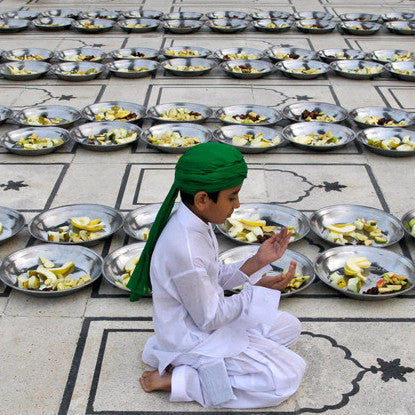
The concept of fasting was never new to me when I converted- after all, I had been told that (usually) Catholics should fast during the period of Lent and on the day of Good Friday (the day Jesus (pbuh) was crucified on the cross). I had never fasted during Lent (it wasn't exactly obligatory, and abstaining from one's favourite activities also kind of counted as well) and the only time I fasted was on Good Friday. It was quite natural that I would have thought of fasting as an act of 'deprivation' in order to experience what Jesus (pbuh) suffered during the final days to his crucifixion. Yep, to me, fasting was suffering.
But in Ramadan, which is to Muslims what Christmas is to Catholics and Christians, why do we fast? Shouldn't this be a happy occasion- to celebrate the beginning of Islam? A bit of background for those, who like me, didn't really know what Ramadan was all about before- It was during the month of Ramadan where Prophet Muhammed (s.a.w.) received the first revelations of the Quran. Shouldn't this happy occasion be celebrated? Why fast? Why suffer?
Last year, I fasted during the first 2 weeks of Ramadan, just to experience what it was like. And I remember the first day I fasted, I was shivering and terribly hungry by dinner time. I remember staring at the pack of nuts on my table, trying to control myself from reaching out to grab a few. And that to me, was suffering, exactly as what I idealized fasting to be.
Yet I remember when I finally broke my fast, the food and water which i consumed felt a thousandfold more sweet and enjoyable than I had ever tasted. No kidding. Being deprived of food for one afternoon had made me really appreciate the break of the fast, simple as it was. And this was the part which opened my eyes to the deeper meaning behind the act of fasting- that it is not about suffering at all, but about enabling us to enter into the state of being that is most apt to worship God.
Looking back, I was glad I went through that two weeks. Alhamdullilah it made me more prepared for Ramadan this year, where I really could reflect and put into action the true meaning of fasting; a concept totally different from what I had used to believe.
How Fasting helps us in Ramadan
(A Reflection by Meryem based on the 29th Letter, Risale I Nur):
1) We remember that God is the True Giver of our gifts and blessings.
God has given to us all sorts of gifts (food, talents, blessing-let's use food here as an example for easier illustration), yet we give our thanks and payments to the ones who appear to hold and present these gifts to us, forgetting the true Owner and Bestower of these bounties. Many of us, especially in Singapore, do not truly experience real hunger because we live in more fortunate conditions. We never have experienced desiring food and yet not being able to eat, because we could always just reach out for a bar of chocolate or snack whenever we want. Through fasting, our eyes are opened to this new experience, that the food that we have is actually a treasured and precious gift from God, and we are to thank Him, not anyone else, for it.
2) We empathise.
Bearing in mind that we as muslims strive to help the less fortunate for God, and never for our 'feel good' emotional state, we are more able to do so when we understand the pains and hunger which the less fortunate suffer and forget caring about how good we look to others while doing it. And the ones who have walked the same path of suffering and hunger are able to truly understand the state of their fellow men who are experiencing the same thing. And the help that they give becomes so much more genuine, more empathetic, and meaningful because they know what it is like to be in their shoes.
Ponder: This, is the difference between "I have helped someone today, and it makes me feel and look good" versus "I have helped someone today for the sake and love of God".
3) We are reminded that we are not all-powerful and indestructible.
All of us instinctively desire to be free and independent, to behave as we want. We quickly attach ourselves to the material world- because it is the only thing we can see (at this point of time) and the possession of more power and wealth allows us to behave and acquire all that we want. It is easy to get caught up in this greedy cycle of achieving, and striving for worldly desires. We forget about God when we begin to worship the world.
Since hunger is the very basic of our needs, and when we are stripped of this power to eat as and when we want in the month of Ramadan, we fully understand that we are owned by God, we cannot eat or drink by His command. And when the hunger reminds us of our powerlessness, we are put in our rightful place, to perform what we were truly ordered to do- to remember, worship and give thanks to God.
4) We focus better on doing good.
Like a King who declares a festival on special days such as the anniversary of his ascension to the throne, and gives generous gifts and favours to his deserving subjects, Ramadan is the month where the rewards which God gives to us is multiplied thousandfold. We celebrate the Holy month spiritually through elevating good deeds and refraining from bad ones,and fasting is but a tool to help our eyes, ears, mouth, heart and thoughts unify and focus in doing so.
5) It is medically beneficial and helps us become more disciplined.
Eating three times a day has become the cultural norm of the world- we cram our stomachs with food even before our previous meal has been digested. We harm our bodies (from the medical point of view) without knowing, as the effects are only suffered in the later stages of our lives. By gorging on food we also lose control of our self-discipline.
Fasting gives us a break by allowing us to feed our bodies only the amount it requires, and disciplines us to 'eat to live' instead of 'live to eat'.
Among the narrations of Hadith is the following: “God Almighty said to the instinctual soul: ‘What am I and what are you?’ The soul replied: ‘I am myself and You are Yourself.’ So He punished it and cast it into Hell, then asked it again. Again it replied: ‘I am myself and You are Yourself.’ However He punished it, it did not give up its egoism. Finally He punished it with hunger; that is, He made it go hungry. Then again He asked it: ‘Who am I and who are you?’ And the soul replied: ‘You are my Compassionate Sustainer and I am your impotent slave!’”
- Risale I Nur, The Twenty-Ninth Letter


Share:
A Muslim Convert's First Travel Experience
The Irony on my Newsfeed
1 comment
Thanks for taking the time to write and share your thoughts. I saw your post about the flash cards that led me to your website here. Liked the fact that you said “eat to live” and not “live to eat” which is so true especially in Singapore where everyone just loves to eat, haha.
I dont know why but I would love to meet you one day insyaAllah. I read up about your posts in 2013 and how you converted to. Alhamdulillah for the journey and conversion.
Take care.